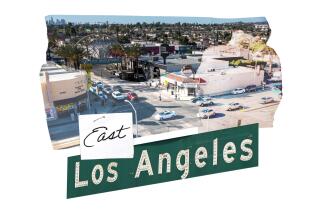Fallbrook Cityhood Foe Singing a Different Tune
FALLBROOK — Five years ago, Dr. Roy Hiscock was an avid opponent of a campaign to incorporate this rural community nestled amid the avocado groves and gently rolling hills of inland North County.
As Hiscock reasoned back then, Fallbrook was doing just fine under the county’s wing and could little afford the financial risk of cityhood. Other residents agreed--they heartily voted down incorporation by nearly a 4-to-1 margin.
But today the dermatologist and former Fallbrook Chamber of Commerce president is singing a different tune.
In recent years Hiscock has watched as friends and neighbors have rallied to defend Fallbrook against what they consider insensitive land-use decisions by the county. Moreover, Hiscock believes the community’s tax base has grown sufficiently since 1981 to support cityhood. To top it off, he says, residents aren’t getting a good enough return in county services for those tax dollars.
So now, Hiscock says, the time is ripe for home rule. Indeed, the longtime Fallbrook resident is spearheading a new effort to incorporate--the fourth such drive in the past three decades.
“We’re at the stage now where we have to rule ourselves,” Hiscock said. “It’ll be much better for decisions to be made by people we see every day in the corner drug store rather than by politicians and bureaucrats in some big office building in San Diego that’s more or less inaccessible.”
Together with several dozen other residents, Hiscock has formed the Fallbrook Incorporation Study Committee to raise funds and sponsor a $7,500 feasibility study to determine whether the community has the fiscal wherewithal to function on its own.
If the numbers support the blue-sky predictions of Hiscock and his allies, residents of the 41-square-mile region sandwiched between the Santa Margarita River and California 76 could be voting on the cityhood question by June, 1988.
Although Fallbrook residents voted down the last cityhood bid by a wide margin in 1981, incorporation supporters maintain the idea enjoys more favor now.
For starters, they contend residents have become restless with the idea of being ruled by a government based in faraway San Diego, a one-hour trip by car. Moreover, the pro-incorporation forces say Fallbrook is being shortchanged on county services, everything from law enforcement protection to maintenance of the community’s nearly 100 miles of roads.
The chief gripe, however, revolves around growth. Hiscock and other incorporation supporters say there is rising concern among residents that county officials are displaying a callous attitude toward land-use decisions affecting the rural ambiance of Fallbrook.
During the past year, residents have become increasingly vocal about several large-scale housing projects they maintain are out of character with the community. One group even sued the county in an effort to block a key land-use decision, but the case was dismissed in August.
“It gets tiresome to have to do things like file lawsuits against the Board of Supervisors,” said Al Fuller, an incorporation advocate. “We know growth isn’t going to stop completely, but a reasonable objective of a government of our own would be to provide orderly growth, planned growth.”
Although no organized opposition to the new incorporation drive has yet surfaced, several past foes of cityhood are keeping a ready eye on the efforts of Hiscock and the others.
As many such incorporation opponents see it, cityhood is just the prescription for rapid, high-density growth.
“It’s a definite fact that incorporated communities grow much faster than unincorporated communities,” said Lou Gillette, a leader of the anti-cityhood forces in 1981. “If we incorporate, anyone who wants to build in Fallbrook would just have to go to the council and give them a song and dance.”
With the county, Gillette maintained, developers find it hard to build because “there’s so many channels to go through, and it costs money.”
Indeed, Gillette says he simply finds the idea of living in a city abhorrent.
“If it saved me a little bit of money to have a city here, I’d be glad to pay a little extra to keep it out,” he said. “I don’t want a city here. I’ve lived in a city most of my life. There’s more people, houses are closer together. It would bring things if we incorporated that people came here to get away from.”
While the incorporation committee’s fiscal study has yet to be completed, Gillette predicted that Fallbrook is woefully short of the needed taxes to finance the services it would provide as a city. Because of that, he speculated, the city easily could be forced to lure industry and big business into the area to make up that shortfall, a move that would ruin the area’s quiet, agrarian appeal.
“A lot of people in Fallbrook are retired, they’ve settled here to spend the rest of their days,” Gillette said. “They’ve come here to get away from all that, all the commotion and stir that happens in an incorporated area.”
Such opposition aside, the incorporation effort has several logistical hurdles that have yet to be cleared. Chief among them is a fast-approaching deadline prompted by a new state law.
Until recently, it was required that counties help out newly incorporated cities by providing free services--such as law enforcement protection and road repairs--for a one-year period.
At the urging of San Diego County officials and other counties being financially stung by numerous incorporations, state lawmakers recently approved a law freeing counties from the obligation to provide a year’s worth of free services.
The new law takes effect Jan. 1, but Fallbrook cityhood advocates can beat its provisions if their application for incorporation is submitted before the end of the year. If the application isn’t turned in on time, it could add in excess of $1.5 million in operating expenses to Fallbrook’s initial start-up costs, incorporation supporters say.
But filing an incorporation application is no easy task. The Fallbrook group must either get signatures of 25% of the community’s registered voters on a petition or convince a local agency to sponsor the incorporation drive.
With the holidays fast approaching, the group has reasoned that it would be tough to garner the more than 3,000 signatures that probably would be needed on a petition. Instead, they’ve opted for the other route and have approached leaders of the Fallbrook Public Utility District about acting as the so-called “lead agency” for the incorporation.
So far, officials from the utility district have balked at the idea, reasoning that they want to wait until they see some numbers that suggest the incorporation will prove fiscally feasible. Incorporation advocates say those figures will be provided by the end of the month and are hopeful the utility district directors will make a decision by early December.
Even if the cityhood backers miss the Jan. 1 deadline, the added operating costs probably would not sink the incorporation, according to Fred Christensen, an Oceanside-based consultant conducting the feasibility study for the Fallbrook group. Christensen said that, under the new state law, the extra costs could be financed over a 10-year period, meaning a new city could spread out its payments.
Such headaches aside, cityhood advocates stress that time for incorporation is now.
“I think it’s better government for Fallbrook,” said Fuller, “than a remote-control government run by a Board of Supervisors, four out of five of whom have no interest in North County.”
More to Read
Sign up for Essential California
The most important California stories and recommendations in your inbox every morning.
You may occasionally receive promotional content from the Los Angeles Times.










